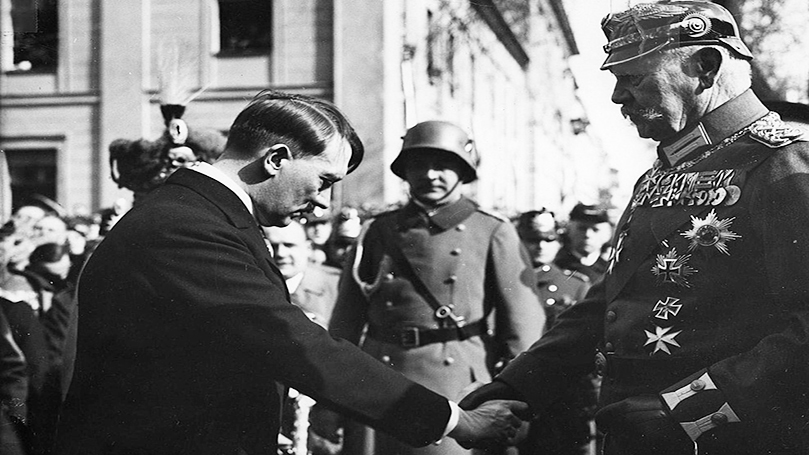
Sometimes, in discussions of fascism, we hear the idea that “Hitler was elected.” In other words, it’s the people’s fault. They chose Hitler. They chose fascism. They were anti-Semites who cared more about persecuting Jews than about protecting their own freedom. The reality isn’t so simple.
It’s true that Hitler’s Nazi Party was the single largest party and voting bloc in Germany in 1932–33. It’s also true that Hitler became Chancellor through constitutional means — that is, he was appointed to the office by Paul von Hindenburg, Germany’s president.
In this sense, German fascism was exceptional. Most other fascist regimes come to power through military means. In Italy, Fascist Squadristi, the infamous “Blackshirts,” marched on Rome, leading King Victor Emmanuel III to appoint Mussolini Prime Minister. Spain’s fascist dictator, Franco, came to power in a bloody civil war. In Portugal, Greece, Chile, Brazil, and Cuba military coups installed fascist rule. Germany’s case stands out by the degree to which Hitler and the Nazi Party used elections to develop a mass base.
At the same time, it’s important not to overstate Hitler’s sway with voters. In July 1932, the peak of the Nazis’ electoral reach, they won 37% of the vote, while 35% went to the Socialist and Communist parties. By November 1932, the tables had turned. The Nazis won 32% of the vote, but the combined total for Socialists and Communists was 36.8%. In the last election before Hitler’s appointment as Chancellor, his party was losing ground!
So what happened?
Most of the history we learn in school remembers Hitler as a talented demagogue: giving fiery speeches, whipping up a frenzy of anti-Semitic paranoia and nationalist fervor, rallying the people to the Reich. But that’s only one side of the picture. Hitler was just as diligent about courting Germany’s ruling class, its financial, industrial, and military elites. He understood that the Nazis would not come to power through direct electoral means, and that he would need their support in order to rule.
According to the constitution of the Weimar Republic, the chancellor and other cabinet members were appointed by the party, or coalition of parties, that held an absolute majority in the legislature. But two successive elections, July and November 1932, had produced no absolute majority in the Reichstag, and all efforts to form a coalition had failed. The decision of chancellor fell to Hindenburg, as president—but in January of 1933, Hindenburg refused to appoint Hitler, declaring even on the day before he issued the appointment that he would not do so.
That’s when Hitler’s efforts to court Germany’s big capitalists paid off. Bankers and industrialists pressured Hindenburg to appoint Hitler to the office of chancellor. They did not make that decision based on Hitler’s electoral strength. In fact, it was after the Nazis had begun to lose votes, in November 1932, that they intervened. Many right-wing industrialists who had not previously supported the Nazis thought that this might be their last chance to exercise the fascist option, short-circuiting democracy to prevent the left from taking control.
Hitler could not have come to power without the large section of German voters who rallied to his populist rhetoric and joined in his scapegoating of Jews and Communists for the capitalist crisis of the Great Depression. But it was not their votes that secured his power; nor was it their interests that guided his policies. He placed himself — his paranoia and megalomania, his rabid anti-Semitism, his promises of Aryan greatness sealed in a thousand-year Reich — at the service of Germany’s industrial and financial elite. In his ambition for total power, they saw an opportunity to crush Communists, socialists, trade unionists, democratic movements and institutions, and any other obstacles to the unchecked rule of property.
Sounds familiar.
Image: , Wikipedia.


 Join Now
Join Now